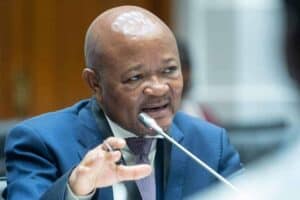If we allow securocrat thugs to trample human rights, we may never regain our post-apartheid freedom after Covid-19 fades.

Current coronavirus restrictions are inappropriate for poor people around the world. Attempts to enforce social distancing and keep people off the streets are well-intentioned but misguided. Brutality will backfire. There must be better ways.
I have worked in Alexandra and other impoverished areas. To see this environment on TV or to read about it is not the same as being there.
Alex is particularly cramped, often with six or more people living in one room. Shacks are jammed impossibly close together. Many streets are so narrow, minibuses can’t enter. Instead, smaller “Alex taxis” proliferate.
In these conditions, to compel people to keep off the streets is cruel. Where are they supposed to go? Remaining a metre apart is easier said than done.
Middle-classes mutter about the need to educate township (iKasi) residents. As 19th-century American writer Herman Melville said: “Of all the preposterous assumptions of humanity over humanity, nothing exceeds most of the criticisms made on the habits of the poor by the well-housed, well-warmed, and well-fed”.
Yesterday CNN said “social distancing is a privilege of the middle class. For India’s slum dwellers, it will be impossible”. In Brazil’s favelas, drug gangs enforce Covid-19 curfews.
Back home, Census 2011 says Alex population density is 26,000 people per square kilometre. Not far away, in my ward, the 2011 figure is 1,660 per square kilometre. So there are 16 times more people per square kilometre in Alex vs Ward 90.
Imposing one-size-fits-all rules cannot be right. We need to slow coronavirus’s spread. But cut these folk some slack in ways that don’t imperil their health or anyone else’s. Beating them into submission is evil.
On Monday, when the death toll from security force brutality – and hardships of queueing – surpassed Covid-19 fatalities, President Cyril Ramaphosa and Defence Minister Nosiviwe Mapisa-Nqakula uttered reassuring noises.
Ramaphosa “made it clear the task of our security personnel is to support, reassure and comfort our people, and to ensure peace and order is maintained. They know they must act within the law at all times and they must not cause harm to any of our people”.
Mapisa-Nqakula was ambivalent, asking residents “to desist from provoking … law enforcement officials”.
Some bullies exceed their authority, ordering citizens indoors, even when residents are already within their own properties. People are being shot, assaulted and/or compelled to do physical exercises.
Brutes are carrying out sentences without regard for due process. Cynics say people are being killed to save them from Covid-19.
The “cool-it” message to security forces may have been the most important part of Ramaphosa’s Monday night address. On its own, it won’t be enough.
Police Minister Bheki Cele was depicted in weekend papers as a barking bully. Neither he nor Mapisa-Nqukula can be relied upon to call off the dogs. If they can’t set the right tone in this crisis, Ramaphosa should dismiss them.
Who guards the guardians? There is an urgent case for multi-party civilian oversight.
This junk-rated nation is perilously poised. If we allow securocrat thugs to trample human rights, we may never regain our post-apartheid freedom after Covid-19 fades. Seriously.
Martin Williams, DA councillor and former editor of The Citizen.
For more news your way, download The Citizen’s app for iOS and Android.






